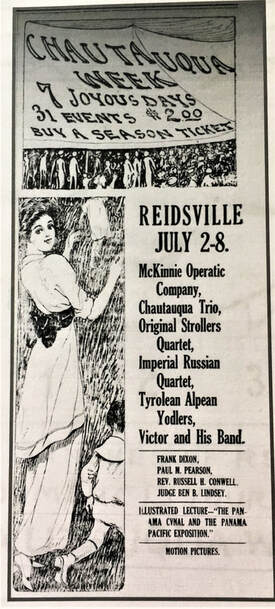 The summer of 1914 looked to be one of great entertainment for the people of Rockingham County. For the first time, the Chautauqua series came to Reidsville, bringing an entire week of fun, learning, and enjoyment. One observer noted, “There is not a dull day for the whole week and there will be in reality Seven Joyous July Days.” Named for the location in southwestern New York state where it originated in 1874, the Chautauqua movement was an effort to bring cultural experiences and enlightenment on a variety of topics to small town and rural America. The “tent” series brought to Reidsville in 1914 was organized by the regional Chautauqua Association of Swarthmore, Pennsylvania. That summer, concerts, lectures, films, and plays came to two hundred towns in ten states. Events were held under massive tents, just as were the traveling carnival entertainments and religious revivals of the time. In total, the organization owned 14 of these large “auditorium” tents and 20,000 chairs that they moved to towns all over the region. The main Reidsville tent presented a “very pretty interior” with good acoustics and plenty of room, according to attendees. Organizers encouraged each stop on the circuit to adopt town colors, and pennants were made to represent each location. In Reidsville, many businesses and homes were decorated with the town colors of orange and black, as well as red, white, and blue for the Chautauqua week. 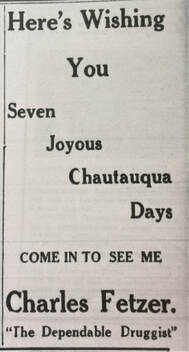 In the first week of July 1914, for a $2.00 ticket, one could attend thirty-one events over seven days. “This is Chautauqua Week in Reidsville,” one supporter wrote, “and now for a good time, ladies and gentlemen!” Musical performers included a Russian quartet, opera vocalists in costumes, and Alpine yodelers. The Imperial Russian Quartet, musicians “trained by Russian masters” who had “traveled over the world,” gave two of the twelve concerts in Reidsville that week. The most popular of all the week’s performers was probably Victor and His Band, a “big brass band” of 25 Italian musicians. The group had earned a reputation with Chautauqua audiences as well as with listeners during their ten years playing at the “big resorts of the Atlantic coast.” “There is no better music than that of an excellent brass band well played,” one admirer wrote. Another said of Victor and His Band, “Their grand concerts were alone worth the price of a season ticket.” In early spring, a promotion for the Chautauqua series had promised that the Tuskegee Institute Singers, “Eight of the Best Singers From Booker T. Washington’s Famous school,” were also under contract to perform in Reidsville, but they did not appear on the July schedule. During the week, local folks could also take in a production of Shakespeare’s “Twelfth Night,” an “illustrated lecture” on the Panama Canal (the engineering marvel about to open the next month) and entertainment from a cartoonist and clay-modeler. A highlight of the week was no doubt the two reels of motion pictures shown each evening, a truly dazzling and exciting opportunity in 1914. Promoters described one reel as a “purpose picture” and the second as a comedy. In order to secure the week’s events, Reidsville citizens made financial commitments and prepared for weeks in advance. To become a stop on the Chautauqua tour, local residents first had to guarantee the organizers a sufficient number of ticket sales in advance. “An almost unbelievable number of people” signed cards at Tucker’s Drug Store, requesting tickets be reserved for them, according to promoters. At $2.00 each, the required number of tickets were sold ahead of time—725—and the names of more than 120 “guarantors” were printed in the local newspaper. During this time, the mayor of Charlottesville, Virginia, wrote to a Reidsville acquaintance, recommending the series: “To have an entertainment of this kind in any community will result in an uplift for the good along all lines.” Some apparently argued that Reidsville was “too small a town to have a real first class Chautauqua,” but local organizers set out to make sure the event was a success. Teachers, especially, were encouraged to take advantage of the Chautauqua, to be “entertained and educated and inspired and refined.” Attending “will be like taking a long trip, and hearing things great,” promoters said, “without leaving the county.” They assured teachers, “It will be like going off on a summer vacation for seven days.” As John T. Oliver was the town’s publicity chairman for the Chautauqua, there were numerous articles and ads in the newspaper he and his family operated, the Reidsville Review. Area businesses had robust advertising campaigns, tying their goods and services to the exciting week promised by the Chautauqua. To promote its men’s clothing, one stated, “You must be properly clad for this great occasion,” and asked, “Are You Ready for the Chautauqua?” Others touted their businesses as good stopping places while in Reidsville. “We will have plenty of seats and cool water for you. Have your friends meet you here,” a furniture and undertaking establishment suggested. The Townshend Buggy Co. proposed even more: “Make our store your Headquarters” while at Chautauqua, they wrote, offering “Comfortable chairs, surreys, buggies, and riding cultivators to rest in, and cool ice water.” Expecting the “greatest crowd that has ever visited Reidsville,” hotels and cafes “laid in big supplies of provisions.” 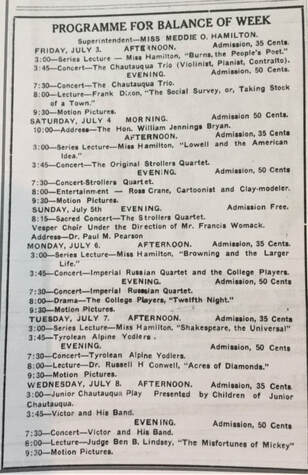 In addition to the concerts and other arts attractions, a number of lectures were also available to ticketholders, including one by Frank Dixon, whose presentation the year before was called “the most talked-of on the Chautauqua program.” Dixon, whose lecture in Reidsville was titled, “The Social Survey, or Taking Stock of a Town,” was a member of a prominent North Carolina family. His brother was Thomas Dixon of The Klansman fame, whose novels on the Reconstruction South envisioned a “Lost Cause” narrative and were the basis for the film “Birth of a Nation” in 1915. Another prominent lecturer was Mrs. Meddie O. Hamilton, an officer with the Chautauqua organization. In the weeks leading up to the series and during the July week as well, Hamilton gave several lectures in Reidsville. She typically spoke on literature and great authors such as Shakespeare, Browning and Longfellow, but at least once she urged her Reidsville audience to support women’s suffrage. She “so eloquently put the argument in favor of allowing the women to vote,” one Reidsville listener said, that “even the most callous of her hearers” was ready to agree. “No nation could rise above the status of its women kind,” Hamilton argued. 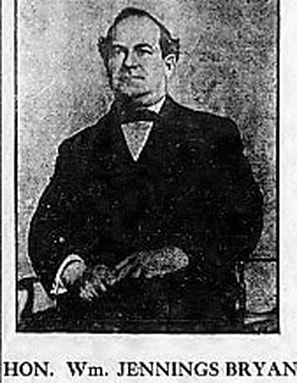 A highlight of Chautauqua week was no doubt the visit by former presidential candidate and member of President Woodrow Wilson’s cabinet, William Jennings Bryan, who was on hand for the 1914 Fourth of July celebration. Noted for his compelling oratory (readers may remember learning about his “Cross of Gold” speech in high school history class), Secretary of State Bryan was one of a half dozen political figures who took to the Chautauqua circuit that summer. He came into Reidsville on the morning train from Washington, D.C. From the depot, he was taken to the New Rockingham Hotel, where he breakfasted with more than twenty regional and local Chautauqua Committee members. One account marveled at the massive breakfast served to Secretary Bryan: “Canteloupe, 3 kinds of breakfast food, peaches, fried spring chicken, with cream gravy, lamb chops, breakfast bacon, sliced tomatoes, French fried potatoes, stewed apricots, eggs as ordered, hot cakes, sourwood honey, Georgia cane syrup, hot biscuits, toast, white bread, instant postum, coffee, tea, milk, all served in true Southern style.” After this hearty breakfast, Bryan spoke to the Reidsville audience for about two hours on the topic, “World Progress, Intellectual, Normal and Political.” Upon the conclusion of his speech, Bryan left on the No. 7 Southern train for High Point, speaking there and in Asheboro during the afternoon, and then on to Statesville that evening. Overall, the performances of the 1914 Chautauqua in Reidsville were called “splendid” and audiences were said to be “thoroughly delighted” by what they experienced. A Chautauqua series typically came to town yearly from 1914 into the 1920s, as Reidsville became a regular stop as one of 33 towns in North Carolina on the Chautauqua circuit. In 1918 one observer noted, “Reidsville every year maintains a Chautauqua week and subscribes funds liberally to secure many of the most noted lecturers and entertainers on the lyceum circuits.” At other times of the year, entertainment during these decades was available at the Grotto Theatre in Reidsville, which offered plays from New York and touring comedy shows, as well as new miraculous motion pictures, “making living pictures on the screen.” Concerts and recitals at the private Reidsville Seminary and at other schools and local theaters meant that the area’s citizens had several cultural experiences available to them, but the Chautauqua series must have been a special entertainment highlight for Rockingham County. View some of the advertisements below... * It might be noted that the term “Chautauqua” had North Carolina origins. Seen on an early John Lawson map, the Tuscarora village of “Chattoka” stood near the site of present-day New Bern. The Tuscaroras carried the name with them to New York when they left Carolina in the 1710s.
References: Articles in the Reidsville (NC) Review: “Chautauqua Schedule,” March 24, 1914, 1; “The Chautauqua Movement Growing,” April 3, 1914, 2; “Letter from Mayor of Charlottesville,” April 7, 1914, 1; “Great Movement Was Advocated,” April 14, 1914, 2; “A Word to the Teachers of Rockingham County,” April 17, 1914, 1; “Chautauqua Week,” June 2, 1914, 4; “William J. Bryan To Speak Here July 4th,” June 2, 1914, 1; “Chautauqua Tickets Being Sold Rapidly,” June 5, 1914, 1; “The News Since Our Last Issue,” June 5, 1914, 2; “West Chester, PA. Has Tried the Chautauqua—Likes It,” June 9, 1914, 7; “Chautauqua Programme,” June 16, 1914, 1; “The Imperial Russian Quartet Wins Praise,” June 16, 1914, 2; “Chautauqua Tent Will Be Decorated in Town Colors,” June 16, 1914, 6; “Committees Named for the Chautauqua,” June 16, 1914, 1; “The Tyrolean Alpine Singers,” June 16, 1914, 1; Masthead, June 16, 1914, 4; “Victor and His Band of Twenty-Five Musicians,” June 16, 1914, 2; “Reidsville Will Give Bryan Big Welcome,” June 30, 1914, 3; “The Chautauqua,” July 3, 1914, 4; “Guarantors for the Reidsville Chautauqua,” July 3, 1914, 5; “First Day of Chautauqua Week Finds City Alive with Enthusiasm and Decorations,” July 3, 1914, 1; “Ready for Reception of Bryan Here Tomorrow,” July 3, 1914, 1; “An Ohio Editor Envies Bryan’s Reidsville Breakfast,” July 14, 1914, 4; “Word ‘Chautauqua’ Had Its Origin in This State,” May 14, 1915, 9. Advertisements in the Reidsville (NC) Review: S.S. Harris, June 5, 1914, 4; Chautauqua Week 7 Joyous Days, June 5, 1914, 2; A. S. Price & Co., June 9, 1914, 6; and July 3, 1914, 6; Burton & Pearson, June 16, 1914, 4; Townshend Buggy Co., June 16, 1914, 5; A. P. Sands, July 3, 1914, 3; Chautauqua Week Smile, July 3, 1914, 4; New Rockingham Hotel, July 3, 1914, 4; Whittemore-Mobley Hardware Company, July 3, 1914, 3; Harris Brothers, July 3, 1914, 3; Charles Fetzer, July 3, 1914, 5; “Chautauqua: Quality Programs for Everybody,” Reidsville Schedule, May 28, 1923, 3. Other sources: T. D. Stokes, “Where We Lead,” in Rockingham County: Economic and Social, University of North Carolina Rockingham County Club, 1918, Clippings Files, “Rockingham County History,” Rockingham County Historical Collections, Gerald B. James Library, Rockingham Community College, Wentworth, North Carolina; “Chautauqua,” William S. Powell, 2006, Ncpedia, https://www.ncpedia.org/chautauqua. Originally in Encyclopedia of North Carolina edited by William S. Powell, University of North Carolina Press, 2006; Chautauqua: An American Narrative, Season 1, Episode 1, PBS, Aired January 31, 2011, https://www.pbs.org/video/chautauqua-an-american-narrative-chautauqua-an-american-narrative/ ;Chautauqua Institution, “Our History,” https://chq.org/about-us/history; William A. Link, North Carolina: Change and Tradition in a Southern State Wheeling, Illinois, 2009), 275-276; “Chautauqua Opens Here Friday with a Mammoth Parade,” Hertford County (NC) Herald, May 25, 1923, 1, North Carolina Newspapers, DigitalNC, http://newspapers.digitalnc.org; “Grotto Theatre Ads,” Reidsville (NC) Review, April 14, 1914, 4, 5 and Reidsville Weekly, December 28, 1914; “What Those Who Attend the Chautauqua Will Hear,” The (Asheboro, NC) Courier, June 11, 1914, 7; and “Mr. Bryan Will Lecture,” June 25, 1914, 1, North Carolina Newspapers, DigitalNC, http://newspapers.digitalnc.org/.
0 Comments
Leave a Reply. |
Articles
All
AuthorsMr. History Author: Bob Carter, County Historian |
|
Rockingham County Historical Society Museum & Archives
1086 NC Hwy 65, Reidsville, NC 27320 P.O. Box 84, Wentworth, NC 27375 [email protected] 336-634-4949 |
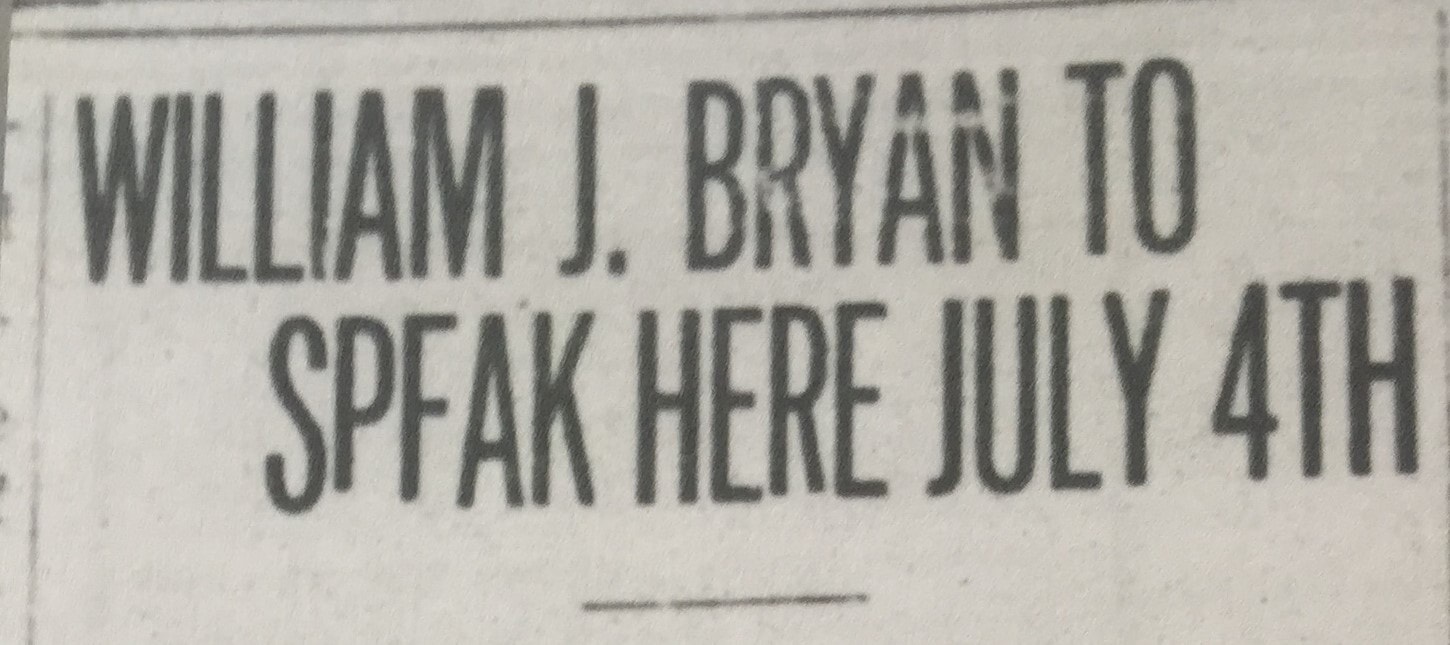
 RSS Feed
RSS Feed
